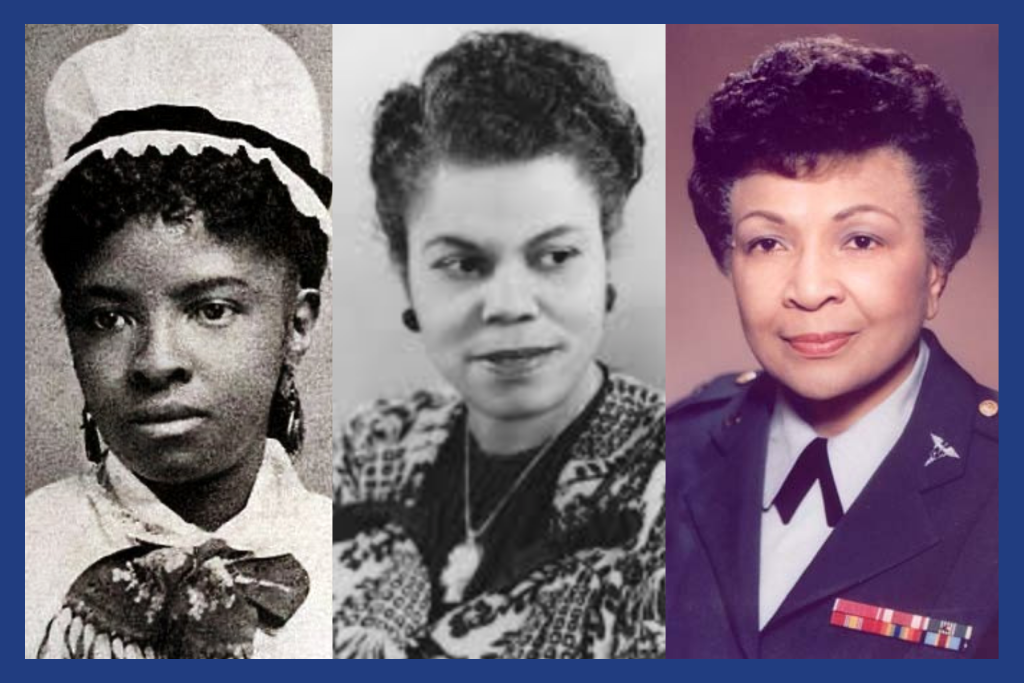As February marks Black History Month, we use this time to celebrate the achievements, culture, and contributions of Black Americans. This year’s dedicated theme, Black Health and Wellness, is especially timely given the ongoing pandemic. Both historically and right now, we celebrate Black medical scholars and healthcare workers.
Here at Aspen University, we honor and remember Black nurses everywhere and throughout history for saving lives, improving the profession of nursing, and making important contributions to healthcare. Black History Month also marks a time to recognize past and current racial disparities including health equity and underrepresented Black healthcare professionals.
According to the publication Minority Nurse, there are around 2,800,000 registered nurses in the United States—but only 10 percent of RNs identify as Black or African American. As the AACN (American Association of Colleges of Nursing) points out, more must be done in nursing to mirror the patient population adequately.
The National Academy of Medicine has joined this call for more diversity in the nursing field, emphasizing that a culturally diverse nursing workforce helps ensure competent patient care. As a nursing university, Aspen is committed to addressing these disparities through initiatives such as the Black Education Matters Scholarship Fund as well as ongoing conversations like our article on the importance of mental health awareness for BIPOC Nurses and communities.
In honor of Black History Month 2022, we’re highlighting notable and innovative Black nurses who shattered barriers in the nursing industry.
Mary Eliza Mahoney
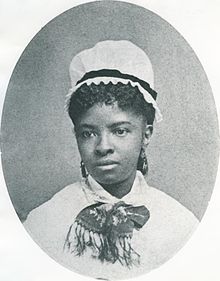 A true trailblazer, Mary Eliza Mahoney was the first professionally trained African American registered nurse in the United States. She worked in a hospital for 15 years across different jobs, starting as a cook, then continued working her way up the chain as a janitor, an unofficial nurse’s aide, and finally, a registered nurse. Out of the 40 students who started in her nursing program, she was one of only three nurses to make it through the New England Hospital graduate nursing program and the only African American awarded a degree.
A true trailblazer, Mary Eliza Mahoney was the first professionally trained African American registered nurse in the United States. She worked in a hospital for 15 years across different jobs, starting as a cook, then continued working her way up the chain as a janitor, an unofficial nurse’s aide, and finally, a registered nurse. Out of the 40 students who started in her nursing program, she was one of only three nurses to make it through the New England Hospital graduate nursing program and the only African American awarded a degree.
In 1908, Mahoney co-founded the National Association of Colored Graduate Nurses (NACGN). This association was vital because, at the time, Black nurses were not allowed to join the American Nurses Association (ANA). The NACGN fought racial discrimination in the nursing profession and uplifted Black nurses, and in 1951, the association merged with the ANA. In honor of her legacy and contributions, the ANA created the Mary Mahoney Award, one of the most prestigious awards a nurse can receive.
Harriet Tubman
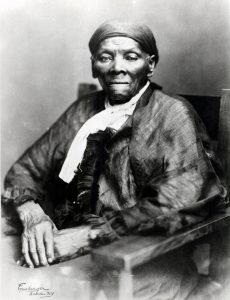 We’re all familiar with Harriet Tubman’s role in American history as an abolitionist who guided slaves to freedom on the Underground Railroad during the Civil War. But she was also a nurse, scout, and spy for the Union, well-known for using mainly natural and herbal remedies to treat her patients. In 1862, Tubman went to a Union camp in South Carolina where she nursed liberated Black soldiers who were formerly enslaved. Then in 1865, Harriet was appointed matron of the Colored Hospital at Fort Monroe, Virginia, where she worked tirelessly trying to heal the sick. An activist and trailblazer all her life, Tubman lived into her nineties fighting for true equality.
We’re all familiar with Harriet Tubman’s role in American history as an abolitionist who guided slaves to freedom on the Underground Railroad during the Civil War. But she was also a nurse, scout, and spy for the Union, well-known for using mainly natural and herbal remedies to treat her patients. In 1862, Tubman went to a Union camp in South Carolina where she nursed liberated Black soldiers who were formerly enslaved. Then in 1865, Harriet was appointed matron of the Colored Hospital at Fort Monroe, Virginia, where she worked tirelessly trying to heal the sick. An activist and trailblazer all her life, Tubman lived into her nineties fighting for true equality.
Estelle Massey Osborne
 Estelle Massey Osborne broke down barriers with her professional accomplishments. The first Black nurse in the United States to earn a Master’s degree, as well as the first Black instructor at New York University in 1945, Osborne was also elected President of the National Association of Colored Graduate Nurses (NACGN). In 1946, she received the Mary Mahoney Award for her efforts to broaden opportunities for Black nurses to move into the mainstream of professional nursing. She forged an essential relationship with the American Nurses Association before the program merged with the NACGN in 1951, and she continued her service in organizations and movements in which she could make a lasting difference.
Estelle Massey Osborne broke down barriers with her professional accomplishments. The first Black nurse in the United States to earn a Master’s degree, as well as the first Black instructor at New York University in 1945, Osborne was also elected President of the National Association of Colored Graduate Nurses (NACGN). In 1946, she received the Mary Mahoney Award for her efforts to broaden opportunities for Black nurses to move into the mainstream of professional nursing. She forged an essential relationship with the American Nurses Association before the program merged with the NACGN in 1951, and she continued her service in organizations and movements in which she could make a lasting difference.
Sojourner Truth
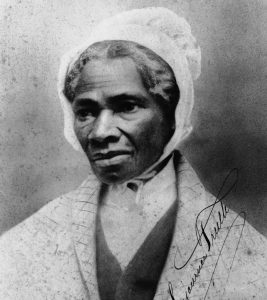
Sojourner Truth is best remembered in history as a profound abolitionist who escaped slavery and as an influential women’s rights activist, but she also holds an important role as a health care advocate. In 1864, as a free woman, Truth worked at the National Freedman’s Relief Association in Washington D.C., where she was invited to meet President Abraham Lincoln. In her role, she lobbied for the needs of African Americans and led efforts to improve the quality of care. Truth also spoke before Congress advocating for the importance of nursing education and professional training for patient care, which at the time didn’t exist.
Mabel Keaton Staupers
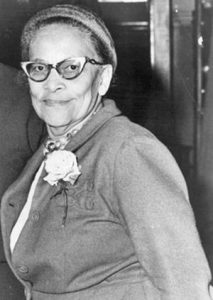 Mabel Keaton Staupers was a nursing pioneer who fought racial segregation and discrimination in healthcare. She immigrated to the United States from Barbados in 1903 and became an RN after graduating from the Freedmen’s Hospital School of Nursing (now Howard University, itself an important historically Black university). Staupers helped establish the Booker T. Washington Sanitarium, credited as the first hospital in Harlem to treat Black Americans with tuberculosis. She is also known for her campaign efforts and large protest to end racial discrimination in the U.S. Army and in the American Nurses Association (ANA). In 1951, the NAACP honored her with the Spingarn Medal, the organization’s highest honor.
Mabel Keaton Staupers was a nursing pioneer who fought racial segregation and discrimination in healthcare. She immigrated to the United States from Barbados in 1903 and became an RN after graduating from the Freedmen’s Hospital School of Nursing (now Howard University, itself an important historically Black university). Staupers helped establish the Booker T. Washington Sanitarium, credited as the first hospital in Harlem to treat Black Americans with tuberculosis. She is also known for her campaign efforts and large protest to end racial discrimination in the U.S. Army and in the American Nurses Association (ANA). In 1951, the NAACP honored her with the Spingarn Medal, the organization’s highest honor.
Lillian Holland Harvey
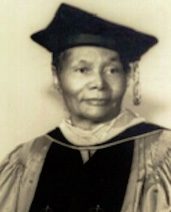 Dr. Lillian Holland Harvey made her mark on nursing as a dedicated educator and leader to students. She initiated the first baccalaureate degree nursing program in the state of Alabama at Tuskegee Institute, leading the School of Nursing for 30 years as the program’s first dean. Dr. Harvey also served on the President’s Commission on the Status of Women, the American Red Cross Advisory Committee on Nursing Service, and the Nursing Advisory Committee of the Kellogg Foundation. In 1982, she received American Nurses Association’s (ANA) prestigious Mary Mahoney Award.
Dr. Lillian Holland Harvey made her mark on nursing as a dedicated educator and leader to students. She initiated the first baccalaureate degree nursing program in the state of Alabama at Tuskegee Institute, leading the School of Nursing for 30 years as the program’s first dean. Dr. Harvey also served on the President’s Commission on the Status of Women, the American Red Cross Advisory Committee on Nursing Service, and the Nursing Advisory Committee of the Kellogg Foundation. In 1982, she received American Nurses Association’s (ANA) prestigious Mary Mahoney Award.
Hazel W. Johnson-Brown
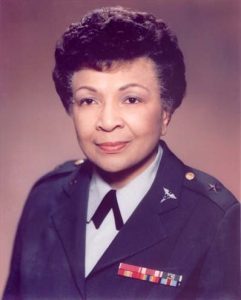 A pioneering military nurse, Hazel W. Johnson-Brown triumphed in the face of adversity as the first Black woman to become a U.S. Army general and the first Black chief of the Army Nurse Corps. After a local hospital told her a Black student would never be accepted into their nursing program, she persevered and earned her nursing diploma in 1950 from the Harlem Hospital School of Nursing. She enlisted in the army traveled the world in service to her country, serving in Japan and training surgical nurses on their way to Vietnam. In the ’70s, she became the director of the Walter Reed Army Institute of Nursing. It was in 1979 that Gen. Johnson-Brown made history when she was promoted to brigadier general and simultaneously to command 7,000 nurses in the Army Nurse Corps.
A pioneering military nurse, Hazel W. Johnson-Brown triumphed in the face of adversity as the first Black woman to become a U.S. Army general and the first Black chief of the Army Nurse Corps. After a local hospital told her a Black student would never be accepted into their nursing program, she persevered and earned her nursing diploma in 1950 from the Harlem Hospital School of Nursing. She enlisted in the army traveled the world in service to her country, serving in Japan and training surgical nurses on their way to Vietnam. In the ’70s, she became the director of the Walter Reed Army Institute of Nursing. It was in 1979 that Gen. Johnson-Brown made history when she was promoted to brigadier general and simultaneously to command 7,000 nurses in the Army Nurse Corps.
Betty Smith Williams
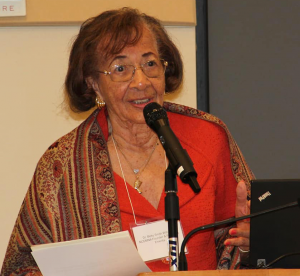 With an influential career spanning over 50 years, Dr. Betty Smith Williams has dedicated her life to education and research as an instrumental leader in creating programs to help increase opportunities for Black nurses. In addition to being the first African American graduate of the Frances Payne Bolton School of Nursing, she was also the first African American nurse to teach in a collegiate-level program in the state of California and has since served as a professor and dean for many schools throughout the country. In 1971, Dr. Williams co-founded the National Black Nurses Association to improve the inclusion of Black nurses and the healthcare for Black Americans. She also went on to co-found the National Coalition of Ethnic Minority Nurse Associations, Inc. (NCEMNA) in 1998 and has been honored with over 70 awards, including the Living Legend of the American Academy of Nursing recognition in 2010.
With an influential career spanning over 50 years, Dr. Betty Smith Williams has dedicated her life to education and research as an instrumental leader in creating programs to help increase opportunities for Black nurses. In addition to being the first African American graduate of the Frances Payne Bolton School of Nursing, she was also the first African American nurse to teach in a collegiate-level program in the state of California and has since served as a professor and dean for many schools throughout the country. In 1971, Dr. Williams co-founded the National Black Nurses Association to improve the inclusion of Black nurses and the healthcare for Black Americans. She also went on to co-found the National Coalition of Ethnic Minority Nurse Associations, Inc. (NCEMNA) in 1998 and has been honored with over 70 awards, including the Living Legend of the American Academy of Nursing recognition in 2010.
Aspen University can help you advance your nursing career with our affordable online RN to BSN, MSN, and DNP degree programs. Looking to become an RN? Consider the BSN Pre-Licensure program.

